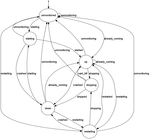Process monitoring tool. Inspired from Bluepill and God. Requires Ruby(MRI) >= 1.9.3-p194. Uses Celluloid and Celluloid::IO.
Little demo, shows general commands and how chain works:
Recommended installation on the server (system wide):
$ sudo /usr/local/ruby/1.9.3/bin/gem install eye
$ sudo ln -sf /usr/local/ruby/1.9.3/bin/eye /usr/local/bin/eye
Config example, shows some typical processes and most of the options (see in exampes/ folder):
examples/test.eye
# load submodules, here just for example
Eye.load("./eye/*.rb")
# Eye self-configuration section
Eye.config do
logger "/tmp/eye.log"
end
# Adding application
Eye.application "test" do
# All options inherits down to the config leafs.
# except `env`, which merging down
working_dir File.expand_path(File.join(File.dirname(__FILE__), %w[ processes ]))
stdall "trash.log" # stdout,err logs for processes by default
env "APP_ENV" => "production" # global env for each processes
trigger :flapping, :times => 10, :within => 1.minute, :retry_in => 10.minutes
check :cpu, :below => 100, :times => 3 # global check for all processes
group "samples" do
chain :grace => 5.seconds # chained start-restart with 5s interval, one by one.
# eye daemonized process
process :sample1 do
pid_file "1.pid" # pid_path will be expanded with the working_dir
start_command "ruby ./sample.rb"
# when no stop_command or stop_signals, default stop is [:TERM, 0.5, :KILL]
# default `restart` command is `stop; start`
daemonize true
stdall "sample1.log"
check :cpu, :below => 30, :times => [3, 5]
end
# self daemonized process
process :sample2 do
pid_file "2.pid"
start_command "ruby ./sample.rb -d --pid 2.pid --log sample2.log"
stop_command "kill -9 {PID}"
check :memory, :below => 300.megabytes, :times => 3
end
end
# daemon with 3 childs
process :forking do
pid_file "forking.pid"
start_command "ruby ./forking.rb start"
stop_command "ruby forking.rb stop"
stdall "forking.log"
start_timeout 10.seconds
stop_timeout 5.seconds
monitor_children do
restart_command "kill -2 {PID}" # for this child process
check :memory, :below => 300.megabytes, :times => 3
end
end
# eventmachine process, daemonized with eye
process :event_machine do |p|
pid_file 'em.pid'
start_command 'ruby em.rb'
stdout 'em.log'
daemonize true
stop_signals [:QUIT, 2.seconds, :KILL]
check :socket, :addr => "tcp://127.0.0.1:33221", :every => 10.seconds, :times => 2,
:timeout => 1.second, :send_data => "ping", :expect_data => /pong/
end
# thin process, self daemonized
process :thin do
pid_file "thin.pid"
start_command "bundle exec thin start -R thin.ru -p 33233 -d -l thin.log -P thin.pid"
stop_signals [:QUIT, 2.seconds, :TERM, 1.seconds, :KILL]
check :http, :url => "http://127.0.0.1:33233/hello", :pattern => /World/,
:every => 5.seconds, :times => [2, 3], :timeout => 1.second
end
end$ eye l(oad) examples/test.eye
load folder with configs:
$ eye l examples/
$ eye l examples/*.rb
foreground load:
$ eye l CONF -f
If eye daemon already started and you call load command, config will be updated (into eye daemon). New objects(applications, groups, processes) will be added and monitored. Removed from config processes will be removed (and stopped if process has stop_on_delete true). Other objects update their configs.
Process statuses:
$ eye i(nfo)
test
samples
sample1 ....................... up (21:52, 0%, 13Mb, <4107>)
sample2 ....................... up (21:52, 0%, 12Mb, <4142>)
event_machine ................... up (21:52, 3%, 26Mb, <4112>)
forking ......................... up (21:52, 0%, 41Mb, <4203>)
child-4206 .................... up (21:52, 0%, 41Mb, <4206>)
child-4211 .................... up (21:52, 0%, 41Mb, <4211>)
child-4214 .................... up (21:52, 0%, 41Mb, <4214>)
thin ............................ up (21:53, 2%, 54Mb, <4228>)
start, stop, restart, delete, monitor, unmonitor
Command params (with restart for example):
$ eye r(estart) all
$ eye r test
$ eye r samples
$ eye r sample1
$ eye r sample*
$ eye r test:samples
$ eye r test:samples:sample1
$ eye r test:samples:sample*
$ eye r test:*sample*
Check config syntax:
$ eye c(heck) examples/test.eye
Config explain (for debug):
$ eye e(xplain) examples/test.eye
Log tracing (tail and grep):
$ eye t(race)
$ eye t test
$ eye t sample
Quit monitoring:
$ eye q(uit)
Interactive info:
$ eye w(atch)
Process statuses history:
$ eye hi(story)
Eye daemon info:
$ eye x(info)
$ eye x -c # for show current config
Process states and events:
Thanks Bluepill for the nice config ideas.




